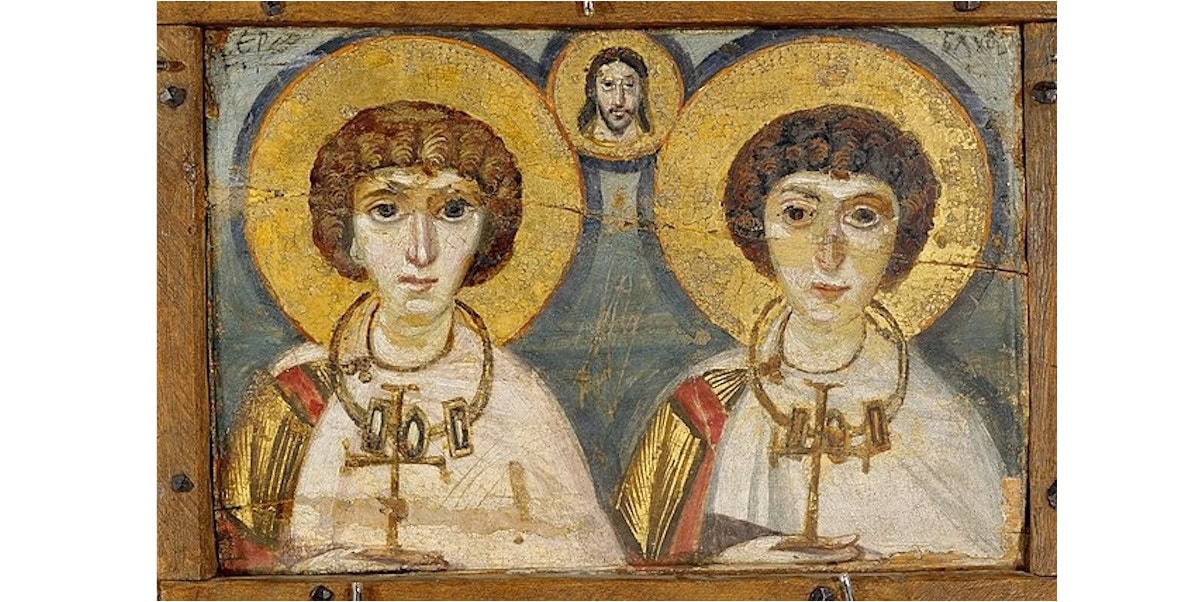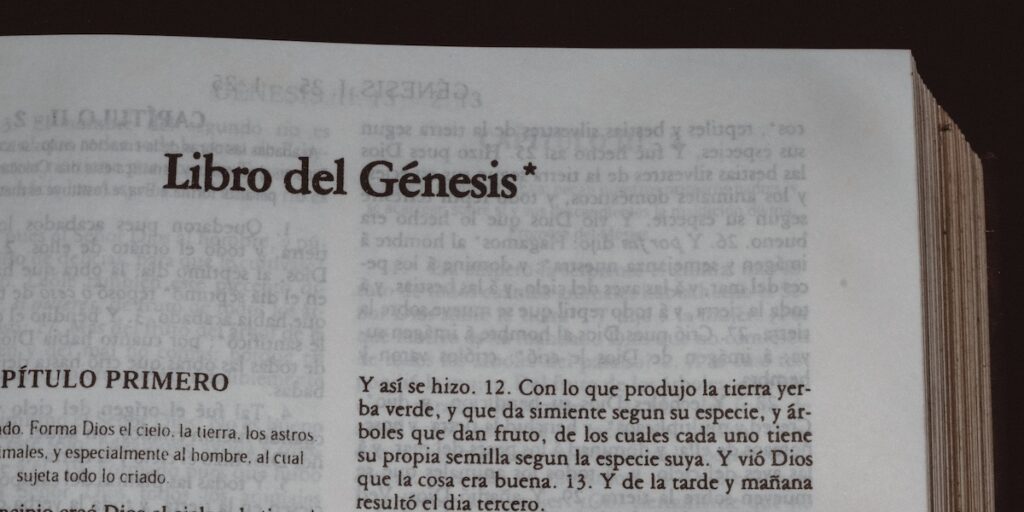In the third to fourth century, there was a young Christian man named Sergius. He lived in Syria, which was part of the Roman Empire at the time. Sergius was conscripted into the Roman army. He made his way up the military ranks. Tradition tells us that he even had a friendship with the Roman Emperor Maximian.
Sergius was accompanied by another Christian soldier named Bacchus. Sergius and Bacchus worked together to become high-ranking officials in the Roman army.
Tradition tells us some very interesting things about these two men.
The Icon of Sergius and Bacchus
First, I want to tell you about an icon from the 7th century. The icon has Sergius and Bacchus depicted side by side with halos. Between them is an image of Jesus, also with a halo. The halos merge into each other as if the three halos were one.
You may be surprised to know that this icon is fairly typical of wedding icons in the ancient Eastern Christian world. The couple would be depicted next to each other with Jesus between them, uniting them together in holy matrimony.
Second, you may also be surprised to know that the oldest account describing the lives of Sergius and Bacchus tells us that they were erestai. The word erestai comes from the Greek word “eros,” which means love, but it’s a specific kind of love. Eros refers to romantic love. To say that Sergius and Bacchas as erestai is to say that they were lovers.
That account of their lives not only calls them lovers but also states that they were “sweet companions.”
The Emperor’s Demand and Punishment
But soon the Emperor heard rumors that Sergius and Bacchus were Christians. Being a Christian was an act of treason to the Empire because it meant that your ultimate loyalty was not to the Empire or to the Emperor, but to Christ.
So the Emperor demanded that Sergius and Bacchus enter the Temple of Jupiter and sacrifice to the gods. They refused to sacrifice to Jupiter and so the Emperor imprisoned them. They were forced to wear women’s clothing as the Emperor tried to humiliate them by forcing them to parade down the streets in women’s clothing for all to see. Apparently, Serge and Bacchus didn’t care, as they saw themselves in a feminine aspect anyway as Brides of Christ.
After this, the pair was separated. They were tortured and beaten. Bacchus died from the beatings. Sergius heard the news and mourned the death of his beloved.
Legend tells us that the dead Bacchus appeared to Segius the night he was murdered, and said to his beloved, “Why do you grieve and mourn, brother? If I have been taken from you in body, I am still with you in the bond of union…. Hurry then, yourself, brother, through beautiful and perfect confession to pursue and obtain me, when finishing the course. For the crown of justice for me is with you.” Bacchus wanted Servius to pursue and obtain him in life and in death. Soon after Sergius experienced this vision of Bacchus, he was tortured and beheaded.
In life and in death, Sergius and Bacchus were united in mind, body, and soul in the spirit of love.
Celebrated as Saints
There is a 9th-century hymn called the Hymnn of Saints Sergius and Bacchus. The hymn, which is about their relationship, starts with these words, “O ye Heavens, draw up the marriage contract as our voices resound with odes.” This 9th-century hymn refers to Sergius and Bacchus’ relationship as a marriage.
We have been told that the Church has always had one view of marriage, but Sergius and Bacchus give us a different story. And they are not alone in Christian history when it comes to same-sex couples. A document from the 11th century describes a same-sex union ceremony. It follows the script for a heterosexual marriage, including the line that the couple’s love “abide without offense or scandal all the days of their lives.”
At the beginning of weddings during this time, a crown was placed on both of their heads. At the end of the ceremony, the crown was lifted off their heads. It may sound odd to us, but the crowns symbolized martyrdom for the couple. Marriage was seen as an act of martyrdom because it meant that you had to die to yourself and have severe self-discipline in relation to your spouse. The imposition and lifting of the crown was the climax of a wedding. It happened in opposite sex unions and it happened in the same-sex unions.
This history affirms that same-sex couples can have the same type of holy and life-giving marriage as heterosexual couples. During many times in Christian history, the response to same-sex relationships was not condemnation. It was thanks be to God. I think that should be our response, too.





